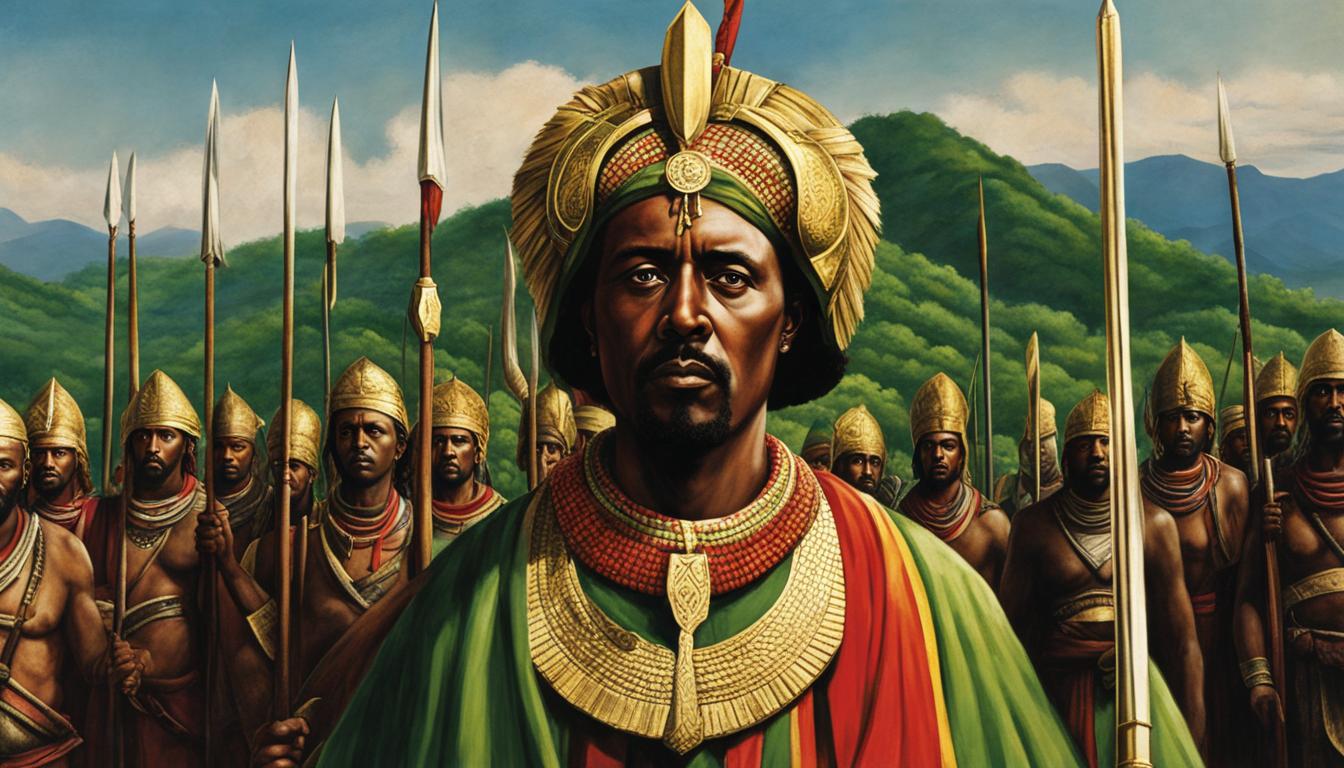How Did Ethiopia Remain Independent?
Did you know that in the late 19th century, European powers were rapidly colonizing Africa? During this time, Ethiopia, a country in East Africa, managed to retain its independence despite the imperialistic ambitions of foreign powers. In this article, we will explore the fascinating history behind Ethiopia’s ability to remain sovereign and the factors that contributed to its independence.
Key Takeaways:
- Ethiopia’s victory at the Battle of Adwa in 1896 secured its independence and inspired anti-colonialist movements.
- Strong resistance, clever diplomacy, and the perception of legitimacy played significant roles in Ethiopia’s independence.
- Geographical landscape, hierarchical political structure, and Ethiopian nationalism also contributed to the country’s sovereignty.
- Ethiopia’s independence stands in contrast to Liberia’s unique path, which relied on the colonization and protection of freed slaves from the United States.
- Both Ethiopia and Liberia faced challenges and compromises in their fight for independence.
The Scramble for Africa and Ethiopia’s Independence
In the late 19th century, European powers were engaged in a fierce competition known as the “Scramble for Africa.” During this time, Italy set its sights on conquering Ethiopia, a sovereign nation in East Africa. In its quest for domination, Italy seized control of the Red Sea port of Massawa and established the colony of Eritrea on Ethiopian land.
Ethiopia’s emperor, Menelik II, understood the gravity of the situation and recognized the threat posed by the Italian encroachment. In an attempt to safeguard his country’s independence, Emperor Menelik II entered into a treaty with Italy. However, this agreement soon became a source of contention as it sparked a major disagreement over Ethiopia’s sovereignty.
To defend their beloved nation, Emperor Menelik II and his wife, Empress Taytu Betul, embarked on an extensive campaign to garner support and sympathy from European powers. They knew that the key to preserving their independence lay not only in military resistance but also in strategic diplomacy and public sentiment.
“Our resistance against the Italian occupation was not just about preserving our empire; it was an assertion of our identity, our culture, and our political sovereignty. We fought not only for ourselves but for the entire African continent, sending a powerful message that we would not be silenced or enslaved.”
Through their tireless efforts, Emperor Menelik II and Empress Taytu Betul portrayed Ethiopia as a proud and ancient empire with a rich political history. Their public relations campaign aimed to highlight Ethiopia’s political achievements, cultural heritage, and the determination of its people to resist foreign domination.
As news of Ethiopia’s resistance and diplomatic maneuvers spread, it began to capture the attention and admiration of European nations. The Ethiopian empire, once seen by outsiders as a remote African kingdom, emerged as a symbol of pride and defiance against imperial ambitions.
Amidst the chaos of the Scramble for Africa, the Ethiopian empire stood strong, showcasing its indomitable spirit and unwavering commitment to its political autonomy. The actions of Emperor Menelik II and Empress Taytu Betul would soon lead to a historic turning point in the struggle for Ethiopian independence.
The Catalyst for Change
On March 1, 1896, the Ethiopian empire faced its greatest test in the Battle of Adwa. This monumental clash between the Ethiopian and Italian forces would determine the fate of Ethiopia’s independence and have far-reaching consequences for the entire continent of Africa.
Emperor Menelik II understood the significance of this moment and summoned his people to mobilize for the defense of their homeland. Thousands of Ethiopian warriors, with unwavering determination in their hearts, answered the call and rallied behind their emperor.
As the Italian army advanced towards the Ethiopian capital of Addis Ababa, Emperor Menelik II and his troops embarked on a courageous and strategically calculated five-month march. Their objective was clear—to crush the Italian invasion and secure Ethiopia’s independence.
The Battle of Adwa raged on, and against all odds, the Ethiopian forces emerged victorious. Their unwavering resolve, superior military tactics, and intimate knowledge of the rugged Ethiopian terrain proved instrumental in their triumph. The Italians suffered heavy casualties and were forced to retreat, leaving Ethiopia intact and free.
This remarkable victory at the Battle of Adwa shattered the myth of European invincibility and undermined Italy’s imperial ambitions. It also sparked a resurgence of Ethiopian nationalism, inspiring other African nations to resist colonial rule and fight for their own independence.
The Aftermath and Legacy
The Battle of Adwa had profound implications for Ethiopian politics and its standing in the global arena. The victory not only consolidated Ethiopia’s independence but also brought international recognition of its sovereignty.
European powers were forced to acknowledge Ethiopia’s resilience and political legitimacy, granting it a unique status among African nations. Emperor Menelik II’s triumphant defense of Ethiopian sovereignty set a precedent for other colonized nations, proving that resistance against imperial powers was not futile.
The Battle of Adwa forever altered the trajectory of Ethiopian history, solidifying its status as one of the few African nations to successfully resist European colonization. It served as a powerful symbol of African resilience and inspired subsequent movements for independence across the continent.
Menelik’s Victory at the Battle of Adwa

Menelik’s leadership and strategic military action at the Battle of Adwa in 1896 played a pivotal role in securing Ethiopia’s independence and shaping its future relations with foreign powers. In mobilizing a large army, Menelik demonstrated the strength of Ethiopian nationalism and the determination to protect their sovereignty.
“We will not allow our beloved Ethiopia to be colonized,” exclaimed Menelik as he rallied the people to defend their land.
The Battle of Adwa marked a critical turning point in Ethiopian history. Italy, seeking to expand its colonial empire, advanced towards Addis Ababa with its well-equipped forces. However, Menelik, with his astute military planning and knowledge of the Ethiopian landscape, led his troops on a five-month march to engage the Italians in battle.
“On March 1, 1896, the Ethiopian forces engaged the Italian army at Adwa, displaying tremendous courage and resilience. Our determination to protect our nation fueled our every move. The bravery and unity exhibited by Ethiopian soldiers inflicted heavy casualties on the Italian invaders.”
– Menelik II
The Ethiopian victory at Adwa, with its remarkable display of military prowess and national pride, not only forced the Italian troops into a full retreat but also shattered the myth of European invincibility in Africa. The collapse of the Italian government as a result of this defeat sent shockwaves throughout Europe, further cementing Ethiopia’s position as an independent nation.
“Our triumph at the Battle of Adwa spoke volumes about the strength of Ethiopian nationalism and our commitment to safeguard our land and resources,” emphasized Menelik in his address to the people.
Menelik’s victory had far-reaching consequences, including the recognition of Ethiopian independence by other European powers. It established Ethiopia as a symbol of resistance against colonialism and inspired other African nations in their fight for freedom.
The Resurgence of Ethiopian Foreign Relations
The Battle of Adwa not only solidified Ethiopia’s independence but also marked a turning point in its foreign relations. The victorious outcome stimulated international attention and reshaped Ethiopia’s position on the global stage.
Ethiopia’s triumph instilled a newfound respect among European powers, as they acknowledged the formidable Ethiopian resistance. Menelik strategically used this recognition to forge diplomatic relationships and strengthen Ethiopia’s position in international affairs.
“Our victory at Adwa demonstrated our capacity for self-rule and command over our territory. It emphasized that Ethiopia’s place in the world should be respected,” proclaimed Menelik, urging European nations to recognize Ethiopia’s sovereignty.
As a result, several European powers established formal diplomatic relations with Ethiopia, acknowledging its independence and granting it a seat at the global diplomatic table. This pivotal moment signaled Ethiopia’s resurgence in foreign relations and its ability to navigate the complex landscape of international diplomacy.
| Consequences of Menelik’s Victory at the Battle of Adwa | Impact |
|---|---|
| Recognition of Ethiopian independence by European powers | Strengthened Ethiopia’s sovereignty |
| Respect and admiration from other African nations | Inspired anti-colonial movements |
| Shattered the myth of European invincibility in Africa | Raised awareness of African military capabilities |
Factors Contributing to Ethiopia’s Independence
Ethiopia’s sovereignty and political autonomy can be attributed to several key factors that played a significant role in maintaining its independence.
Geographical Landscape: A Natural Defense
The unique geographical landscape of Ethiopia played a crucial role in safeguarding its sovereignty. Surrounded by highlands, mountains, and treacherous terrains, Ethiopia’s rugged geography made it difficult for foreign armies to conquer the country. This natural defense provided a strategic advantage, allowing the Ethiopian forces to effectively resist external threats and preserve their independence.
Advanced Hierarchical Political Structure
Ethiopia’s advanced hierarchical political structure was another contributing factor to its independence. The country’s political system, with a central government led by an emperor, enabled efficient governance and unified decision-making in times of external aggression. This organized structure allowed the Ethiopian leadership to mobilize resources, deploy armies, and respond effectively to safeguard the nation’s political autonomy.
Ethiopian Nationalism: Strength in Unity
A strong sense of Ethiopian nationalism played a critical role in uniting the country against foreign threats. Ethiopians shared a collective identity, rooted in a rich history, culture, and heritage. This shared sense of belonging fostered a deep loyalty and commitment to protect the nation’s sovereignty, ensuring that Ethiopians stood together in the face of external challenges.
“Our unity and unwavering commitment to our nation’s independence have been our greatest strength in preserving Ethiopia’s sovereignty.”
Perception of Legitimacy on the World Stage
The perception of legitimacy was an essential factor in maintaining Ethiopian independence. Ethiopia’s long-established history as an independent nation, dating back centuries, contributed to its recognition as a sovereign state by other countries. Additionally, Ethiopia’s active participation in international affairs, diplomatic engagements, and adherence to international norms further solidified its legitimacy on the world stage.
These factors, including the challenging landscape, advanced political structure, Ethiopian nationalism, and perceived legitimacy, collectively contributed to Ethiopia’s ability to preserve its independence and maintain its sovereignty in the face of external pressures.
Liberia’s Unique Path to Independence

Unlike Ethiopia, Liberia’s independence followed a different trajectory. It was the result of the “Back to Africa” movement, which originated from the desire to establish a colony for freed slaves from the United States. In 1822, these freed slaves founded the American Colonization Society and established a settlement in West Africa, laying the foundation for the future nation of Liberia.
In 1847, Liberia officially declared independence, becoming the first African republic. The new nation enjoyed the protection and assistance of the United States, which played a crucial role in preventing European invasion and supporting Liberia in conflicts with native African tribes. This support from the United States helped solidify Liberia’s sovereignty and establish its place among independent nations.
“The people of the United States and Liberia share a common bond rooted in history, freedom, and liberation.” – President George W. Bush
However, Liberia’s independence was not without challenges. The country faced European economic intrusion, particularly from British and French traders who exploited its resources. The influence of the United States in Liberia’s affairs also created complexities, as the American government had a significant presence and influence in the region.
Despite these challenges, Liberia’s unique history as a nation founded by freed slaves and its ongoing struggle for independence have shaped its identity and sovereignty. Today, Liberia continues to navigate its path as a sovereign nation, facing both internal and external challenges but firmly rooted in its rich and complex history.
The Legacy of Liberian Independence
The legacy of Liberian independence serves as an important reminder of the resilience and determination of its people. It is a testament to the power of self-determination and the pursuit of freedom against all odds. Liberia’s history offers valuable lessons on the complexities of establishing and maintaining sovereignty, illustrating the intricate dynamics between external influences, international relations, and the struggle for independence.
Conclusion
In conclusion, the stories of Ethiopian independence and Liberian independence showcase the remarkable resilience and determination of these two African nations. Despite facing different challenges, both Ethiopia and Liberia managed to maintain their sovereignty during the colonial era.
Ethiopia’s victory at the Battle of Adwa in 1896 was a watershed moment that solidified its independence. The brave and well-armed Ethiopian forces successfully repelled the Italian invasion, sending a powerful message to other European powers. This victory, coupled with diplomatic engagements, further solidified Ethiopia’s position as a sovereign nation.
On the other hand, Liberia’s path to independence took a unique course. Founded in 1822 by freed African-American slaves, Liberia declared its independence in 1847. The United States’ support and protection played a vital role in Liberia’s early years as an independent nation. However, economic intrusion by European powers and foreign influence, including that of the United States, posed challenges to Liberia’s complete sovereignty.
Despite the unique paths Ethiopia and Liberia took, both countries endured challenges and compromises to maintain their independence. Ethiopia remained independent through strategic diplomacy, resistance, and a perception of legitimacy. Liberia relied on external support and faced interference in its affairs, but it persevered as an independent nation.
The stories of Ethiopia and Liberia stand as inspiring examples of the fight for independence and the unwavering determination of nations to preserve their sovereignty. These African nations have left a lasting legacy, reminding us of the ongoing struggle for self-determination and the importance of preserving independence.




